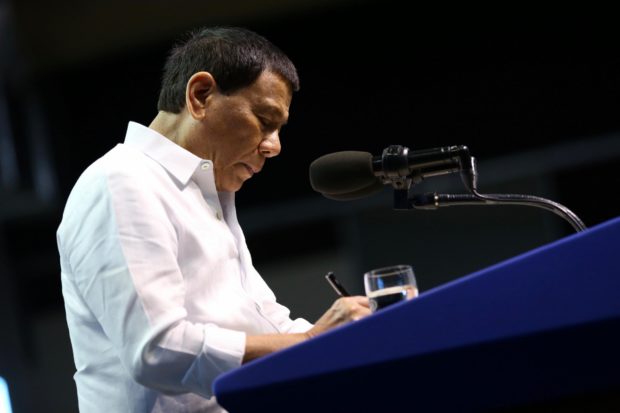
President Rodrigo Duterte. RICHARD MADELO/PRESIDENTIAL PHOTO
President Rodrigo Duterte has ordered a “rebirth” of land reform in the country, as he directed the Department of Agrarian Reform (DAR) to launch what he described as a second phase of the program.
Agrarian Reform Secretary John Castriciones on Thursday echoed the instructions of the President, for the government to pursue an “aggressive” land reform program that will help alleviate the life of poor Filipino farmers.
“The word the President used is a ‘renaissance’ of land reform in the country,” he said, adding that a relaunch of the program will focus on idle government lands.
The DAR aims to cover some 561,000 hectares of agricultural land, which it aims to distribute to landless farmers at an average of 50,000 hectares a year.
This includes the over 500,000 hectares of undistributed lands under the old law on Comprehensive Agrarian Reform Program Extension with Reforms (Carper), which was terminated in 2014.
Castriciones said DAR will aim to complete these lands covered by the Carper, issued with notices of coverage but of which the conversion and awards to farmer-beneficiaries were not consummated.
The President on Wednesday said he is exasperated over the apparent failure of the agrarian reform program to attain its objectives to help farmers over the years.
“Agriculture is the weakest link and has been bogging efforts since time of (former presidents Ferdinand Marcos and Corazon Aquino). Asar na ako (I am pissed off),” the President was quoted as having told a group of farmers in Quezon.
Duterte led the distribution of 389 certificate of land ownership awards (CLOAs) covering a total of 639 hectares in Mulanay town, where he gave the DAR instructions to relaunch a second phase of land reform.
“If money is used properly, I think that by the time I leave, a sizeable hectares of lands will be used (in land reform), and I would have played a little part in solving the problem,” the President said.
For the second phase of the agrarian reform program, Castriciones said the DAR is eyeing to cover mainly military reservations and lands occupied by state universities and colleges that have been left idle.
Among the government-owned lands that the DAR initially hopes to include in the relaunched land reform program are about 3,000 hectares of the University of Southern Mindanao in Arakan Valley in Cotabato province; about 6,000 hectares of the Davao penal colony; and more or less 1,000 hectares of the Yulo King Ranch in Busuanga and Coron towns in Palawan province. /jpv